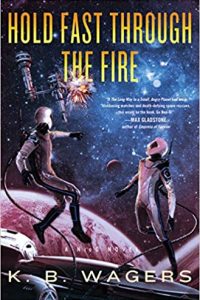Alexandra Pierce Reviews You are My Sunshine and Other Stories by Octavia Cade
 You are My Sunshine and Other Stories, Octavia Cade (Stelliform Press 978-1-77908-264-0, $19.99, 384pp, pb) September 2023. Cover by Rachel Lobbenberg.
You are My Sunshine and Other Stories, Octavia Cade (Stelliform Press 978-1-77908-264-0, $19.99, 384pp, pb) September 2023. Cover by Rachel Lobbenberg.
Across the 15 stories collected in You are My Sunshine and Other Stories, Octavia Cade takes the reader through possible outcomes of climate change – what it may be like to through it, what might come out the other side. Written across the better part of a decade and originally published in multiple venues, the stories nonetheless present a coherent, compelling vision.
Aside from climate change, several themes unite this collection. Many of the stories center on the place of humans in the world – not just incidentally, such as by creating waste, but as active participants, through deliberate actions towards the nonhuman world. Perhaps unsurprisingly, therefore, there’s a lot of bitterness in the stories; Cade does not hold back in pointing out the realities of wilful, deliberate, human destructiveness. And yet there is hope, too: not always and especially not in the early stories, but this is not a completely negative reading experience by any means. And alongside those themes, Cade also brings in the importance of generosity, and being willing to receive as well as give. Even – perhaps especially – in the most difficult of circumstances, generosity can exist.
The first three stories set up the entire collection. The opener, ‘‘We Feed the Bears of Fire and Ice’’, is probably the most distressing. It uses the thawing of Arctic regions and the burning of Australia to highlight the impact of climate change on animals as well as humans. (This Australian was initially irritated at the ‘‘the koala is a bear’’ aspect, but Cade uses this as part of the story, so it was okay.) It’s a powerful story that underpins the collection beautifully: punches will not be pulled. It’s followed by ‘‘Eight Things We Found Under the Ice, After the Arctic Melted’’, a provocative title if ever there was one. These two stories are told with a particularly ironic authorial voice – commenting on the choices humans make, projecting consequences, speculating on intentions – that blurs the line between traditional story and commentary in fascinating ways. The third, titular story is also distressing, involving as it does a character who finds real human arms deposited around his property, as well as discussion of ‘‘the Grief’’ – people succumbing to suicidal depression because of ecological loss. And yet, amidst the horror – and it is horrific, what is happening to the world – there is community and hope.
The rest of the collection emphasises different impacts of climate change, and the relationship between humanity and Earth. ‘‘Tidemarks’’ is a ghost story – a penguin ghost story, that is. ‘‘Gone to Earth’’ suggests the potential for ‘‘Earthsickness’’; after all, we don’t really know how humans will react if they spend extended time on Mars, unable to see or touch the green and blue and brown of home (this was one of my favorite stories). ‘‘Inside the Body of Relatives’’ is a rather unexpected take on the AI-programmed house, while also boldly sketching connections between humans and all other life on Earth. ‘‘The Streams are Paved with Fish Traps’’ is a glorious vision for how humans could make cities places that are actually inviting to all forms of life. And ‘‘You’re Not the Only One’’ focuses on a community who support one another through all things: an astronaut whose mission is delayed because of an unexpected carbon dioxide increase, and ‘‘we need to balance our priorities’’ (what an idea!); a woman whose child is expected to live only minutes after birth.
The final story is ‘‘The History of a Coral Future’’ and in it, humans have learned to make all their places into metaphorical reefs: that is, places where individuals – human, animal, plant – all contribute to a greater whole. Humans aren’t going hungry and the environment is not being destroyed. And so, from the apocalyptic vision of ‘‘We Feed the Bears’’, Cade brings us across these stories to a vision of hope. What starts in horror concludes with optimism. It’s a beautifully curated collection.
Alexandra Pierce reads, writes, podcasts, cooks and knits; she’s Australian and a feminist. She was a host of the Hugo Award winning podcast Galactic Suburbia for a decade; her new podcast is all about indie bookshops and is called Paper Defiance. Alex has edited two award-winning non-fiction anthologies, Letters to Tiptree and Luminscent Threads: Connections to Octavia E Butler. She reviews a wide range of books at www.randomalex.net.
This review and more like it in the September 2023 issue of Locus.
 While you are here, please take a moment to support Locus with a one-time or recurring donation. We rely on reader donations to keep the magazine and site going, and would like to keep the site paywall free, but WE NEED YOUR FINANCIAL SUPPORT to continue quality coverage of the science fiction and fantasy field.
While you are here, please take a moment to support Locus with a one-time or recurring donation. We rely on reader donations to keep the magazine and site going, and would like to keep the site paywall free, but WE NEED YOUR FINANCIAL SUPPORT to continue quality coverage of the science fiction and fantasy field.
©Locus Magazine. Copyrighted material may not be republished without permission of LSFF.







